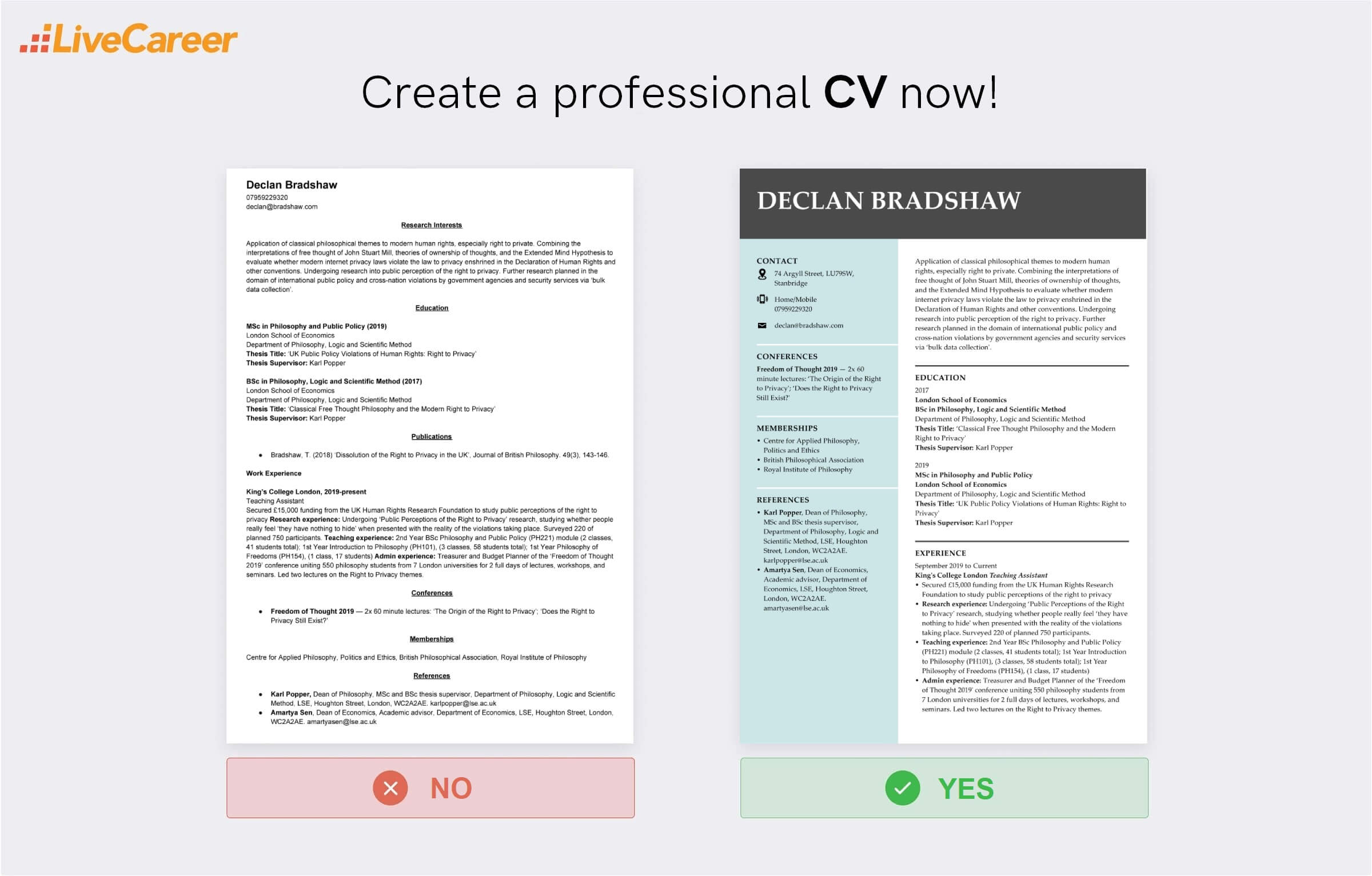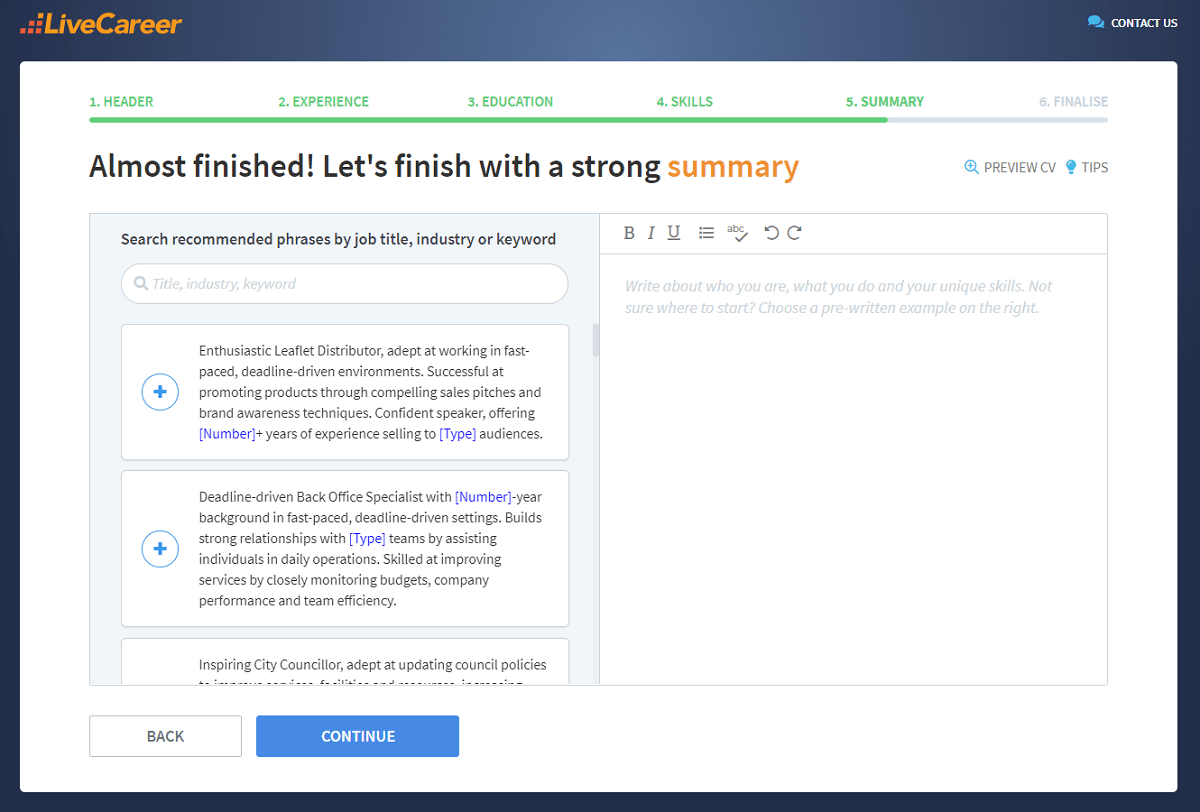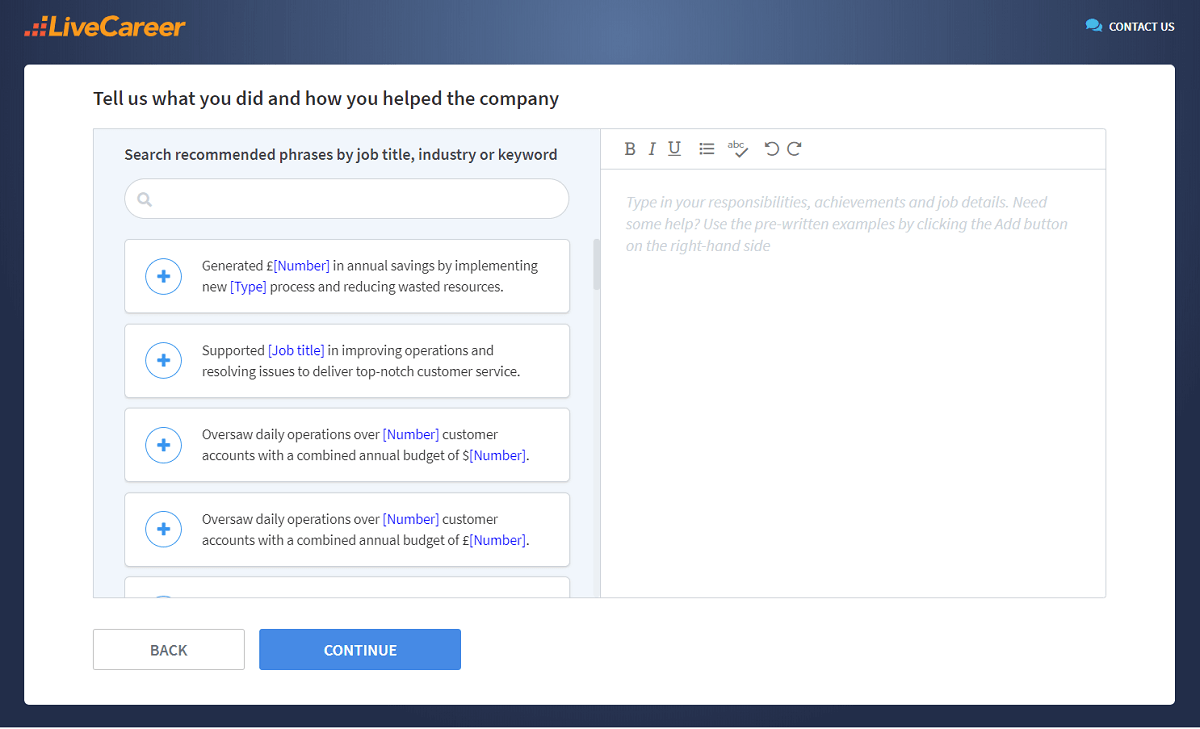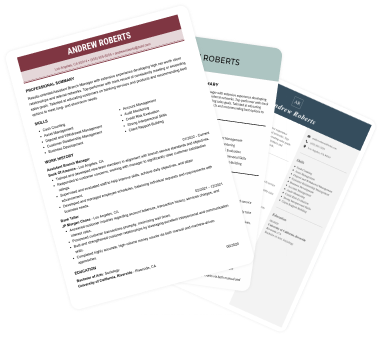
Retail CV Example: Template, Examples & Writing Guide
Get a top-notch retail CV example and learn how to create your own. See the best-selling retail CV templates and choose one that fits you best.
December 29, 2025
Last updated on 29 December, 2025

A well-crafted academic CV is essential for showcasing your research, teaching experience, and academic achievements. Whether you're applying for a lectureship, a postdoctoral position, or a research grant, your CV must reflect your expertise with precision and professionalism.
This guide will show you an expert academic CV template for the UK market, academic CV examples to get inspiration for your CV, and plenty of tips on how to write an academic CV that catches attention with the first lines.
Create an effective CV in minutes. Choose a professional CV template and fill in every section of your CV in a flash using ready-made content and expert tips.

We created the sample on the left using our builder. See other good CV examples like this one.
Need a different CV? Check our other CV guides:
Haven't found your job? Check our full list of professional CV examples.
Declan Bradshaw
74 Argyll Street
Stanbridge
LU79SW
07959229320
declan@bradshaw.com
Research Interests
Application of classical philosophical themes to modern human rights, especially right to private. Combining the interpretations of free thought of John Stuart Mill, theories of ownership of thoughts, and the Extended Mind Hypothesis to evaluate whether modern internet privacy laws violate the law to privacy enshrined in the Declaration of Human Rights and other conventions. Undergoing research into public perception of the right to privacy. Further research planned in the domain of international public policy and cross-nation violations by government agencies and security services via ‘bulk data collection’.
Education
MSc in Philosophy and Public Policy (2019)
London School of Economics
Department of Philosophy, Logic and Scientific Method
Thesis Title: ‘UK Public Policy Violations of Human Rights: Right to Privacy’
Thesis Supervisor: Karl Popper
BSc in Philosophy, Logic and Scientific Method (2017)
London School of Economics
Department of Philosophy, Logic and Scientific Method
Thesis Title: ‘Classical Free Thought Philosophy and the Modern Right to Privacy’
Thesis Supervisor: Karl Popper
Publications
Work Experience
King’s College London, 2019-present
Teaching Assistant
Conferences
Memberships
References
So that's how a good CV should look like. Here’s how to make your academic CV equally good:
Academic CV differs from a commercial CV. The traditional CV personal statement that outlines work experience, should outline research interests in an academic CV.
Briefly state the position or programme you’re applying for, explaining your best past research, your current focus, and future research plans. Show them what you can bring to the table, and your general career objectives. Be very matter-of-fact, concise and avoid ambiguous, vague, and unnecessary statements.
Keep this part of your academic CV to 5-8 lines at the very maximum. You can go more in-depth in your cover letter of course, and don’t forget you’re going to be supplying a list of publications anyway. Pique their interest, show your value.
Completed government-funded research titled ‘The role of parent occupations in early adulthood fiscal responsibility’. Further research planned into the role of working class upbringing on fiscal responsibility and debt, and the effectiveness of proposed fiscal responsibility programs in schools. Funding secured for initial pilot study in 2021 from the British Institute of Social Mobility.
A strong CV summary will convince the recruiter you’re the perfect candidate. Save time and choose a ready-made personal statement written by career experts and adjust it to your needs in the LiveCareer CV builder.

In reverse-chronological order, list your degrees, titles of your theses and their supervisors, as well as graduation dates. If you have special achievements or key features to describe in your education section, try to limit yourself to 2-3 bullet points for each.
Also, list all your degrees and classifications on your academic CV. Some positions call for you to even list your A-Level grades, but for a PhD application, that may be a little too much detail—that you’re taking away from other sections by taking up space. If you’re not sure how far to go back—call them up and ask.
Education
MSc in Microeconomics (2019)
Leeds University
Department of Economics
Thesis Title: ‘The Role of Parents in Early Adulthood Fiscal Responsibility’
Thesis Supervisor: John Keynes
BSc in Microeconomics (2017)
London School of Economics
Department of Economics
Thesis Title: ‘Working Class Fiscal Responsibility’
Thesis Supervisor: John Keynes
This is what makes you an academic, isn’t it? I would implore you to list this section here. Unless you have a lot of awards and funding to talk about, or you are applying to a teaching position and you have a lot of teaching experience. In that case, prioritise those CV sections under your education.
Regardless of where it is, make sure you provide the full details of your publications—in the same way as if you were citing them, and use a consistent citation style. If you collaborated on a lot of research with others, you may want to underline your name.
If you have a lot of different types of publications, group them into sections, such as: monographs, journal articles, edited volumes, books, conference papers, government publications, etc.
If something you wrote is not published just yet but is about to be, include it with an expected publication date. Extra points for checking which citation style the institution prefers, and using that one.
If you have any patents, it could be wise to group them together under your publications. List the title, patent number, inventors and the date the patent was awarded.
See these academic CV examples:
Publications
Publications
The work experience section on your CV will differ slightly from a commercial one. Use the reverse-chronological format, listing your most recent appointment first. You can try one of the following styles:
Work Experience
Institution Name, Dates
Job Title
OR
Work Experience
Institution Name 1, Job Title, Dates
Institution Name 2, Job Title, Dates (and so on)
Awards and Funding
Research Experience:
Teaching Experience:
Admin Experience:
Either style you choose, it will be easier for the person reading your academic CV if you split it up into these three distinct experience categories:
List any fellowships, postdoctoral appointments, and research assistant jobs. This is also the place to expand on your ‘Research Interests’ section if you feel that’s appropriate and will help advance your application.
List any classes, tutorials, seminars, and lecturing you have given. If that’s scarce, include supervising, demonstrations, mentoring, or even non-academic teaching jobs. List the subjects you taught, the level of students, and class sizes.
List any seminars/conferences/other events you have organised, committees and bodies you sat on, and any other organisational experience. This is what can differ you from a lot of other academic CVs, many of your competitors will not be this multi-dimensional.
A skills section can help you save space if the same things are cropping up in the descriptions of other sections. Collect key skills for a CV under a single heading of ‘Relevant Skills & Training’. See or try to predict which job skills are most desired by your new employer.
List any formal training or certifications you received (with dates), including teacher training, research method training, or certifications you gained privately that make you a more rounded candidate.
Relevant Skills & Training
Self-explanatory. List all your academic body and professional memberships, with dates, and roles (if you are performing any roles for them). If you are in a formal role, feel free to drop a few bullet points with some achievements to enhance your academic CV.
Memberships
Don’t list everything you’ve ever been to. Focus on those where you organised or chaired sessions. If you produced any documents for those conferences, cite them in the same way you cite your publications.
Conferences
Ideally, you would list 2-3 academic referees, if you only have 2, feel free to list 1 non-academic referee. Include their name, position, relation to you (for example, thesis supervisor), address (at their institution), and contact details.
Make sure your academic CV references are people you have a good relationship with, and ideally, that are somewhat known in your field of study.
References:
Check thoroughly what other documents the institution expects to receive from you. We can’t help with specialist essays, but we can help with an academic cover letter will surely be one. Make sure it captures attention right away by following the tips in our ‘How to Start a Cover Letter’ guide.
If the guidelines are unclear as to what to submit, always consult the institution. They’re not going to keep secrets from you. Make sure not only the opening of your cover letter is strong, but also that you know ‘How to End a Cover Letter’ with confidence and a call to action.
You will not be trusted to keep your research or teaching organised if you can’t do the same with your application. With this much information, things can slide around and get sloppy. Therefore, follow our CV format guidelines:
There you go! There’s your ladder all the way to the top of the ivory tower!
You don’t have to be a CV writing expert. In the LiveCareer CV builder you’ll find ready-made content for every industry and position, which you can then add with a single click.

Does that answer all your questions on how to write an academic CV? Did you find our academic CV examples helpful? If you’ve got any questions, please use the comments section below. I’m looking forward to hearing from you.
Our editorial team has reviewed this article for compliance with LiveCareer’s editorial guidelines. It’s to ensure that our expert advice and recommendations are consistent across all our career guides and align with current CV and cover letter writing standards and trends. We’re trusted by over 10 million job seekers, supporting them on their way to finding their dream job. Each article is preceded by research and scrutiny to ensure our content responds to current market trends and demand.
Category: CV Help
Crafting a job-winning CV is all about showcasing your unique skills and experiences. Start with a strong personal statement that highlights your career goals and achievements.
Try Our CV Builder Now